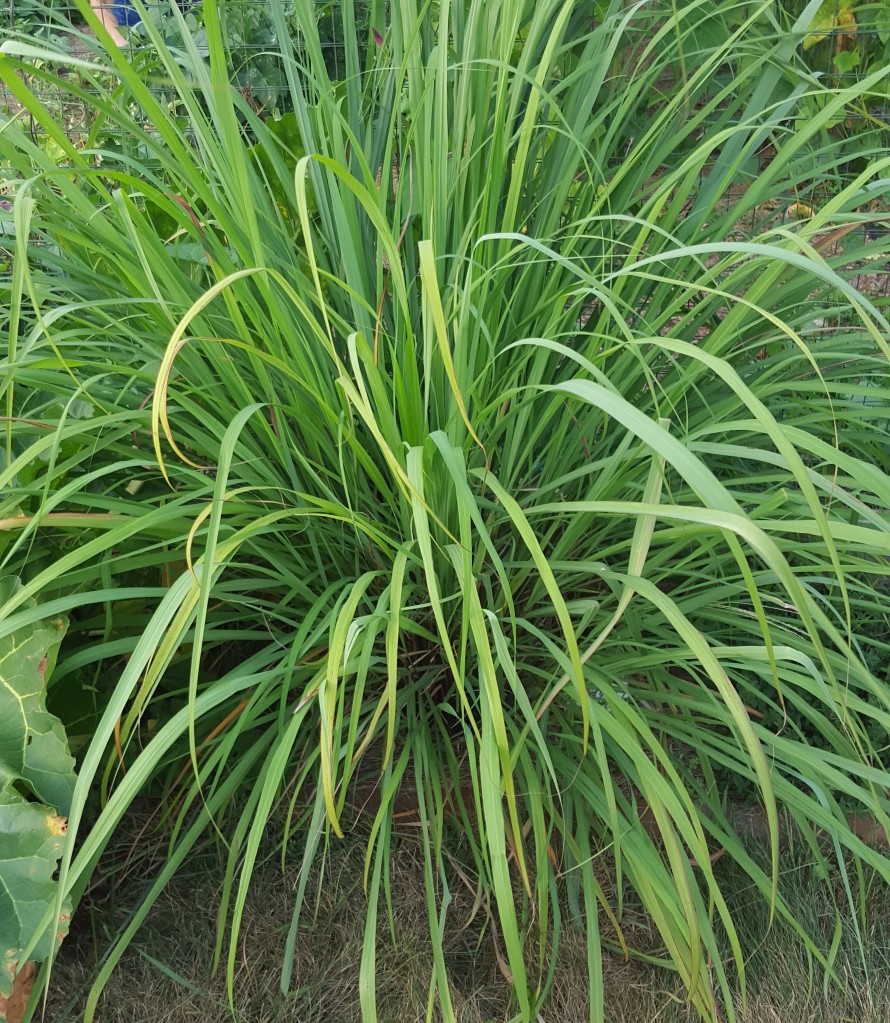When looking for an effective mosquito repellent, consumers are often urged to buy one that contains DEET. DEET has been proven to repel mosquitoes and is safe for humans when sprayed on the skin. However, it does destroy the fibers in your clothing over the course of a few summers.
I don’t want to put something on my skin that destroys the fibers in my clothing. Fortunately, I don’t have to. There are quite a few herbs that will repel mosquitoes and are safe for both me and my clothing.
 Basil – (Ocimum basilicum) Probably the most surprising mosquito repellent is basil. That’s because the essential oil of basil is toxic to the larvae of mosquitoes so the adults naturally stay away the plant. Plant basil around your outdoor living areas to keep them mosquito free. You can even make a spray using fresh leaves or essential oil to use on yourself.
Basil – (Ocimum basilicum) Probably the most surprising mosquito repellent is basil. That’s because the essential oil of basil is toxic to the larvae of mosquitoes so the adults naturally stay away the plant. Plant basil around your outdoor living areas to keep them mosquito free. You can even make a spray using fresh leaves or essential oil to use on yourself.
Basil is very easy to grow. It just needs lots of sun, lots of heat and lots of water. You can even grow it from seed.
 Catnip – (Nepeta cataria) The same chemical in catnip, nepetalactone, that cats find so attractive, repels mosquitoes. According to entomologists, catnip is 10 times more effective than DEET in repelling mosquitoes. You can plant it in your outdoor living areas or rub the leaves on your skin to provide personal protection. Just be aware that if you do use catnip on your body, cats in the area will find you irresistible.
Catnip – (Nepeta cataria) The same chemical in catnip, nepetalactone, that cats find so attractive, repels mosquitoes. According to entomologists, catnip is 10 times more effective than DEET in repelling mosquitoes. You can plant it in your outdoor living areas or rub the leaves on your skin to provide personal protection. Just be aware that if you do use catnip on your body, cats in the area will find you irresistible.
Catnip is a member of the mint family, and while it is not as invasive as mint, it will freely reseed itself around your garden. Catnip is a perennial that is drought tolerant once it is established and will tolerate partial shade.
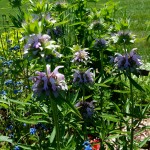 Horsemint – (Monarda citriodora), is also known as lemon bee balm. The lemon scent of the plants which we like, is distasteful to mosquitoes who will avoid it.
Horsemint – (Monarda citriodora), is also known as lemon bee balm. The lemon scent of the plants which we like, is distasteful to mosquitoes who will avoid it.
A native plant to the Midwest, it is a prairie perennial that is both drought and shade tolerant.
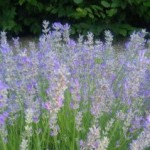 Lavender – (Lavandula spp) traditionally used to keep moths out of linens, lavender is also effective against mosquitoes. You can use it in your garden but it is most effective when you rub it on your skin.
Lavender – (Lavandula spp) traditionally used to keep moths out of linens, lavender is also effective against mosquitoes. You can use it in your garden but it is most effective when you rub it on your skin.
Lavender comes in an array of sizes and colors. It is drought tolerant and needs full sun. It does not tolerate any shade.
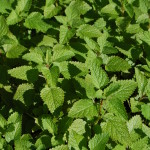 Lemon Balm – (Melissa officinalis) a member of the mint family with a lemon scent that repels mosquitoes. Rub it on your skin to keep yourself free of skeeters.
Lemon Balm – (Melissa officinalis) a member of the mint family with a lemon scent that repels mosquitoes. Rub it on your skin to keep yourself free of skeeters.
Lemon balm reseeds aggressively. Prune it to a few inches several times during the summer to prevent it from flowering. It is shade tolerant and should be watered regularly.
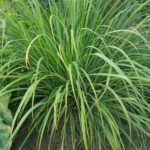 Lemongrass – (Cymbopogon citratus) A grass that is native to Southeast Asia and used in traditional Asian cuisines, it contains citronella, a natural oil that is an effective mosquito repellent. Citronella is often used in candles that are burned outdoors to keep insects away.
Lemongrass – (Cymbopogon citratus) A grass that is native to Southeast Asia and used in traditional Asian cuisines, it contains citronella, a natural oil that is an effective mosquito repellent. Citronella is often used in candles that are burned outdoors to keep insects away.
Lemongrass is a tropical grass that can be dug up and over-wintered indoors in temperate climates. It requires full sun.
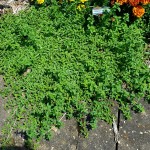 Pennyroyal – (Mentha pulegium) Used for centuries to repel pests, pennyroyal should be used very carefully. It is toxic and can be fatal when ingested by children. It is not absorbed through the skin, so you can safely rub the leaves on your skin as a natural minty smelling mosquito repellent.
Pennyroyal – (Mentha pulegium) Used for centuries to repel pests, pennyroyal should be used very carefully. It is toxic and can be fatal when ingested by children. It is not absorbed through the skin, so you can safely rub the leaves on your skin as a natural minty smelling mosquito repellent.
Pennyroyal is member of the mint family and spreads aggressively. Grow it in a container so that it doesn’t take over your garden. It should be well-watered and will tolerate light shade.
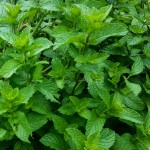 Peppermint – (Mentha piperita) Like basil, the essential oil of peppermint will kill mosquito larvae so adult mosquitoes stay away from it. Rub the leaves on your skin or if you are bitten by a mosquito, rub a leaf on the bite to take away the itch.
Peppermint – (Mentha piperita) Like basil, the essential oil of peppermint will kill mosquito larvae so adult mosquitoes stay away from it. Rub the leaves on your skin or if you are bitten by a mosquito, rub a leaf on the bite to take away the itch.
Peppermint is extremely aggressive and should only be grown in containers. It will tolerate partial shade but does not like to be dry. Keep it well-watered.
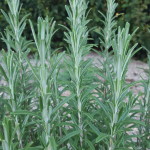 Rosemary – (Rosmarinus officinalis) A must in every cook’s garden, mosquitoes hate the smell and stay away. You can make an effective repellent spray with either fresh leaves or the essential oil. Throw rosemary and sage into your firepit to keep mosquitoes and other insects away.
Rosemary – (Rosmarinus officinalis) A must in every cook’s garden, mosquitoes hate the smell and stay away. You can make an effective repellent spray with either fresh leaves or the essential oil. Throw rosemary and sage into your firepit to keep mosquitoes and other insects away.
Rosemary is a drought tolerant perennial that is hardy only through zone 7. In colder climates, it should be brought indoors during the winter. Whether indoors or outdoors, it needs full sun.
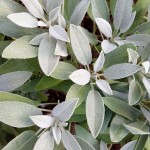 Sage – (Salvia officinalis) Next time you are outdoors gathered around your firepit, throw some rosemary and sage into the fire. The resulting smoke smells lovely to us but not to mosquitoes and other insects who will stay away.
Sage – (Salvia officinalis) Next time you are outdoors gathered around your firepit, throw some rosemary and sage into the fire. The resulting smoke smells lovely to us but not to mosquitoes and other insects who will stay away.
Sage, like rosemary, is a Mediterranean native that likes to be dry, but hardier. It will tolerate light shade.

